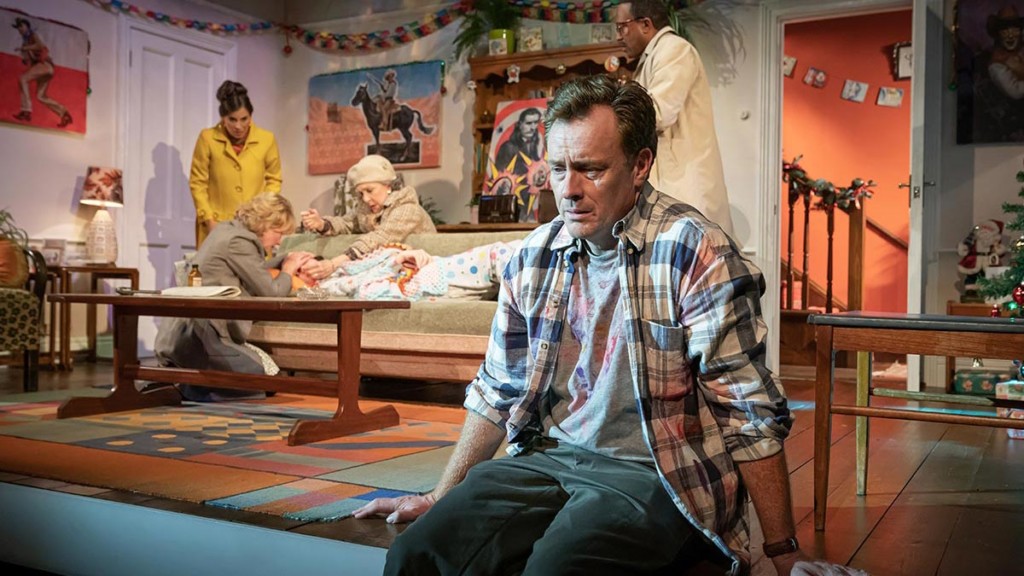JOE EGG – LIFE, DEATH AND DISABILITY
TODAY’S BLOG
JOE EGG – LIFE, DEATH AND DISABILITY
Trafalgar Studios have a run of “A Day in the Death of Joe Egg” a play by the late Peter Nichols. Like many of his plays, this is drawn from personal experience. The play considers the how a family copes with disability. Written in 1967 it is now located with a 50-year timeline. The convenient political distance of the 1960s has much that will encourage an audience about the improvements in both medical and support services over the last 50 years, not least of which is the language used.
The very first lines of the play are somewhat discomforting. Bri (Toby Stephens) addresses his classroom of pupils, who are clearly at the end of their lesson and he at the end of his tether, all eager to leave the confines of the classroom. His directions to the imaginary school children confuse the audience, many of whom respond to his instructions to place their hands on their heads in silence. We immediately enter a world that isn’t quite as expected. The line between what is real (a lecture or talk about disability) and what is not (the play) is blurred.
SOME UNCOMFORTABLE TRUTHS
The play itself could be a metaphor for uncomfortable truths that families do not wish to discuss, as outlined in the show notes. Set originally in not that post-war Britain, a determined modernist approach to life of keep calm and carry on. This discomforting truth is the severely impaired daughter Josephine (Storme Toolis) that Sheila (Claire Skinner) and Bri have had together. It is the run up to Christmas, they relate their tale of how as new parents they were treated by the twin authorities of the day – medicine and religion. Both failing spectacularly to address the underlying questions or providing an appropriate human response.

Production photography by Marc Brenner
DARK CHRISTMAS STORY
Beliefs underpin much of this Christmas story. Bri is unable to cope with the constant care-giving that Joe requires, yet in truth he is able to escape to his classroom most days of the week, leaving Sheila to manage the care. Bri uses comedic dark humour to form conversation between the three of them, which Shelia indulges as part of helping him cope with the situation. Bri, clearly a product of his mother Grace (Patrica Hodge) is often lamenting what might have been. Similarly, Sheila blames herself, her own “promiscuity” and holding back during the lengthy labour that lead her to believe she is responsible to Jo’s condition.
Discussion about Joe is sometimes deeply empathic, at others very cold and theoretical, viewing her or anyone with disability as a “problem”. For some such problems are placed where they cannot be seen, some eradicated, some front and centre. On this advent evening, Joe is all three. The child seen only for the first time, by friends, (Freddie and Pam) the “prop-like” presence front of stage and the tender protective embrace of her parents. Freddie and Pam barely disguise their own discomfort at confronting the reality of living with disability.
Our own discomfort at listening to the conversations is heightened by the knowledge that these conversations are normally deeply private, perhaps never spoken, yet here they are enacted before and with an actor with a disability (Storme Toolis) the first to actually play the role in 50 years. Bad taste jokes that hang in the air like the sword of Damocles.
LIVING WITH DISABILITY
This inability with disability is something that a family have to adjust to. Yet I was mindful that disability is obviously not exclusively something that someone is born with. Any of us can become “disabled” in a moment. There are of course degrees of ability and its loss. Managing expectations and coping with the practicalities is often challenging.
I was reminded of three groups of clients. Those that have children or family members with disabilities of varying degrees, who can tell of the difficulties in obtaining support. Then those that have become so, largely though stroke or accident. Then there are those that work with the severely impaired. One has spent the majority of her life living and working in a L’Arche community. They all have a fascinating story, as do those around them.
Most of us wouldn’t generally expect to become disabled, yet in many respects the loss of ability is a simple by-product of the aging process. We might be unfortunate to suffer a life changing sudden loss, such as a stroke, for which insurance can go some way to help alleviate the practical challenges, but inevitably not the loss of function.
This is a very thoughtful, provocative play, one of its era but with validity for today. Our cultural impetus to remove the uncomfortable out of sight is confronted with poignant truths that pose challenges and touch an empathy that is often just as hidden.
JUST THE TICKET..
The play is shown at Trafalgar Studios until the end of November 2019. You can get tickets here.
Dominic Thomas
Solomons IFA
You can read more articles about Pensions, Wealth Management, Retirement, Investments, Financial Planning and Estate Planning on my blog which gets updated every week. If you would like to talk to me about your personal wealth planning and how we can make you stay wealthier for longer then please get in touch by calling 08000 736 273 or email info@solomonsifa.co.uk

GET IN TOUCH
Solomon’s Independent Financial Advisers
The Old Bakery, 2D Edna Road, Raynes Park, London, SW20 8BT
Email – info@solomonsifa.co.uk
Call – 020 8542 8084

GET IN TOUCH
Solomon’s Independent Financial Advisers
The Old Bakery, 2D Edna Road, Raynes Park, London, SW20 8BT
Email – info@solomonsifa.co.uk Call – 020 8542 8084